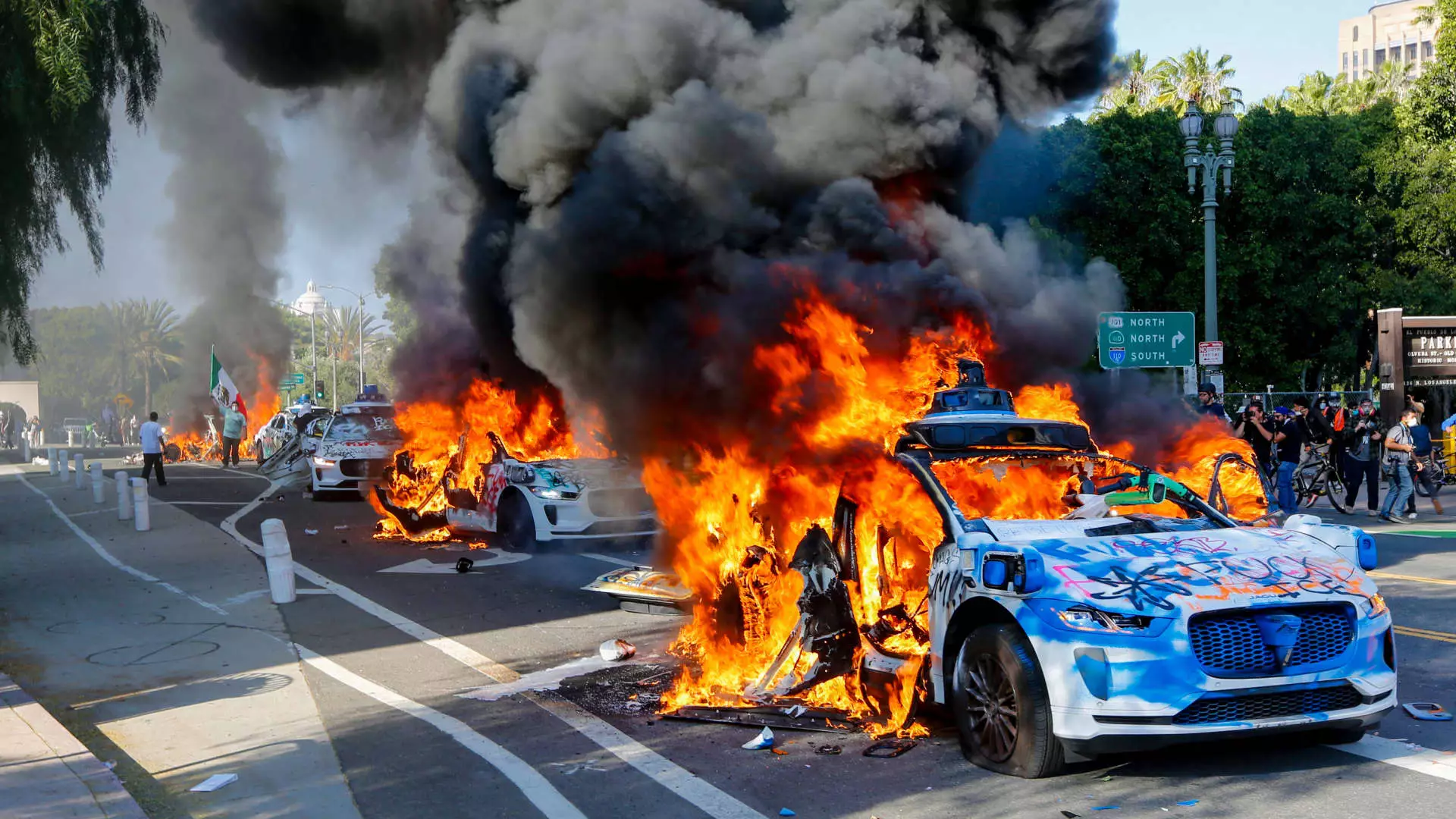The recent abomination of several Waymo autonomous vehicles in downtown Los Angeles during robust protests against President Donald Trump’s immigration policies marks a troubling intersection of technology and civil unrest. This incident isn’t merely about the destruction of property; it represents the deeper societal fractures erupting beneath the shiny surface of automation and progress. The protest, sparked by Immigration and Customs Enforcement (ICE) raids, resonated with many, reflecting widespread dissatisfaction with governmental decisions that predominantly harm marginalized communities. In the chaos of chanting voices and clashing ideals, the Waymo vehicles became mere canvases illustrating dissent and anger toward an administration perceived as cruel.
Waymo, owned by Alphabet, has emerged as a symbol of advanced technology poised to revolutionize transportation in America. But when such cutting-edge innovations collide with civic fervor, the results can be disastrous—not only for the businesses involved but also for the public perception of technology’s role in social justice. The extremist response to these vehicles—set ablaze as part of a protest—exemplifies that amid escalating tensions, even the most futuristic assets are not immune to the fiery rage of those defending human dignity and rights.
The System’s Fragile Backbone
The Los Angeles protests, predominantly peaceful, saw an unfortunate turning point when police clashed with demonstrators over the weekend. The involvement of the California National Guard, deployed via an executive order from Trump, only intensified the atmosphere of fear and chaos. Democratic Governor Gavin Newsom’s explicit declaration of pursuing legal action against this militarization of local protests sheds light on the stark divide in political ideologies—one viewing human rights as paramount, while the other sees stringent law enforcement as the first line of defense against disorder.
In this precarious situation, the response from entities like Waymo becomes critical. The company’s decision to suspend services in protest areas exhibits both caution and a vulnerability often overlooked in high-tech ventures. While these automated vehicles are designed to enhance mobility, their exposure to societal upheaval underscores how reliant even innovative tech is on societal stability. Thus, the flames that consumed the Waymo cars encapsulate a broader anxiety regarding how quickly progress can be reversed or intercepted by civil disapproval.
A New Era of Protest and Expression
It’s crucial to analyze what these fiery protests signal for the society at large. The display of anti-ICE graffiti adorning Waymo vehicles serves as a bold form of expression at a time when traditional methods of dissent seem increasingly ineffective. In an era dominated by social media and digital activism, the visual impact of burning technology plays a significant role in getting a message across, transcending mere words. Protesters wielding e-scooters to further the destruction symbolically ties together the rapidly advancing tech landscape with the individuals’ plight against oppressive governmental actions.
Furthermore, decades of simmering tensions over immigration have erupted into an undeniable cultural moment. When people feel disenfranchised to the point of resorting to such drastic actions, it signals an urgent need for reform that goes beyond superficial government narratives. The implications are significant not only for how we perceive immigration and enforcement but also for how communities react to technological shifts that may override human experiences.
Bridging Gaps or Widening Divides?
Technological advancements, particularly in the realm of autonomous vehicles, always carry the potential to transform lives for the better. However, as demonstrated by the incidents involving Waymo, such transformations can hit walls of societal resistance. For many, the presence of self-driving cars is an affront—a reminder of a future that holds little consideration for those left behind in the wake of progress.
In essence, Waymo’s plight during these protests highlights the dire need for businesses, especially in the tech sector, to engage more deeply with the communities in which they operate. It’s not merely about providing a service; it’s about fostering trust and understanding. If corporations hope to thrive in a world increasingly defined by civil unrest, they must evolve into stewards of dual responsibility—pushing for innovation while remaining acutely aware of the socio-political realities shaping the lives of their potential users. The lights of progress should never dim the voices of authenticity, lest they find themselves engulfed in the flames of collective outrage.


Leave a Reply